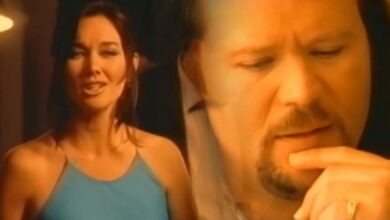Keith’s “Flowers On The Wall” honors Reid, showing he can sing anything, deeply missed, both in Heaven’s choir
The Statler Brothers, renowned for their distinctive harmonies and narrative-driven lyrics, left an indelible mark on country music during their illustrious career spanning several decades. Formed in 1955 in Staunton, Virginia, the group initially consisted of brothers Harold Reid, Don Reid, Phil Balsley, and Lew DeWitt. Their close-knit vocal arrangements and ability to blend traditional country sounds with contemporary themes garnered them widespread acclaim and a loyal fan base.
“Flowers on the Wall,” penned by group member Lew DeWitt, catapulted The Statler Brothers to fame upon its release in 1965. The song’s unique blend of melancholy lyrics and upbeat instrumentation struck a chord with audiences, propelling it to the upper reaches of both the country and pop music charts. Its success not only solidified their place in country music history but also showcased their versatility in crafting songs that resonated across genres.
Harold Reid, celebrated for his deep bass vocals and charismatic stage presence, played a pivotal role in defining the group’s dynamic. Beyond his vocal talents, Reid was known for injecting humor into their performances, providing a lively contrast to their often introspective lyrics. His contributions as a songwriter and performer helped shape The Statler Brothers’ identity as storytellers, chronicling everyday life with sincerity and poignancy.
The passing of Harold Reid in 2020 marked the end of an era for fans and fellow musicians alike. His warm demeanor and genuine passion for music endeared him to generations of listeners, leaving behind a legacy that continues to resonate within the country music community. Toby Keith, a prominent figure in contemporary country music known for his resonant baritone and poignant songwriting, paid homage to Reid’s legacy with a heartfelt rendition of “Flowers on the Wall.”
Keith’s acoustic interpretation of the song stripped away the layers of production, allowing its poignant lyrics to take center stage. His emotive delivery captured the essence of the song’s introspective themes, honoring Reid’s memory with a sincere and respectful tribute. The simplicity of the acoustic arrangement underscored the timeless quality of the music created by The Statler Brothers, reaffirming the enduring appeal of their songs even in a modern context.
The tribute performance by Toby Keith not only celebrated Harold Reid’s contributions to country music but also highlighted the deep camaraderie and respect within the industry. It served as a poignant reminder of the connections forged through music, transcending generations and paying homage to those who paved the way. By choosing to interpret “Flowers on the Wall,” Keith not only honored Reid’s memory but also ensured that the song’s legacy would continue to resonate with audiences new and old.
The enduring popularity of “Flowers on the Wall” speaks to its universal themes of loneliness and introspection, themes that have resonated throughout the decades since its release. The song’s ability to evoke emotion and empathy has made it a timeless classic within the country music canon, cherished for its lyrical depth and melodic charm. Toby Keith’s tribute performance captured the essence of these qualities, offering a heartfelt homage to a song and an artist who left an indelible mark on the genre.
In conclusion, Toby Keith’s acoustic rendition of “Flowers on the Wall” stands as a testament to the enduring legacy of Harold Reid and The Statler Brothers. Through his heartfelt tribute, Keith honored Reid’s memory while celebrating the timeless appeal of a classic country song. The performance served as a poignant reminder of the power of music to unite and uplift, embodying the deep connections forged within the country music community. As listeners continue to discover and appreciate the music of The Statler Brothers, “Flowers on the Wall” remains a poignant reminder of Harold Reid’s enduring impact on country music and his contribution to its rich tapestry of storytelling and songcraft.





